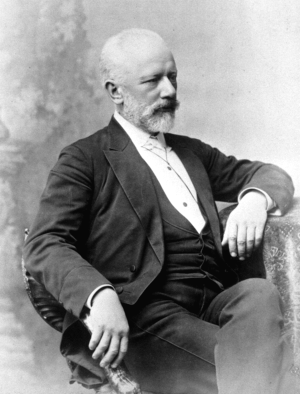
Reprising this charming anecdote about his commitment to music, as reported by cellist Yulian Poplavsky, who knew Tchaikovsky at the time:
The event was a performance of Rimsky-Korsakov’s Spanish Capriccio, which was to be conducted by the composer himself in a concert for the Russian Musical Society. The great Tchaikovsky was in attendance for the afternoon rehearsal before the evening performance.
Most of the musicians in the orchestra were German and very good, but in rehearsal, as Poplavsky tells it, “a heavy and sleepy German in the orchestra took up the castanets. He played them so lazily and out of rhythm that the lusty dances of Andalusia were utterly lost, and all of the color disappeared. Rimsky-Korsakov simply dropped his hands, and his face clouded over.
“In the evening, they began the concert. During the intermission, before the Spanish Capriccio, I saw Tchaikovsky backstage. In great agitation he was trying to convince Rimsky-Korsakov of something. I approached.
“‘Listen [said Tchaikovsky], that was nothing like castanets; it was Bismarck chewing nuts. He’ll ruin us! I’ll play myself.’
“Tchaikovsky took the music and the castanets and stood in the back of the orchestra, behind the timpani. The capriccio began. The heavy German was nowhere to be seen. When the musicians saw that Tchaikovsky himself would be playing the castanets, they were dumbfounded. They began. It is impossible to describe the performance. Germans are, after all, excellent musicians and they were so shocked by this that they tried as hard as they could.”
I love the image of Tchaikovsky’s playing castanets, and his being able to inspire a whole orchestra to great effort by doing so.
(One quibble with Poplavsky’s telling of the tale, as he ends it by saying of Tchaikovsky’s action, “Only a great artist can sacrifice his personality to art in such a manner.” I suppose Poplavsky means something like this: playing the castanets at the back of the orchestra should be seen as beneath the dignity of a great composer like Tchaikovsky, so his dignity was sacrificed to make the performance work. I think, by contrast, the castanets were not beneath anyone’s dignity but importantly critical to this performance, and that Tchaikovsky’s willingness to play them was not a sacrifice of his personality but an expression of his personality’s commitment to musical excellence.)
Source: Excerpts from Poplavsky’s memoir in Alexander Poznansky’s Tchaikovsky Through Others’ Eyes (Indiana University Press, 1999), pp. 236-7.
Related: Could Tchaikovsky play Tchaikovsky?
One cannot make music, nor write it down (it is, in fact, the performer who “makes” the music), without loving music. To make the sacrifice above would be like a husband, who wanting to read a good book, must “sacrifice” his leisure time to drive his wife to the hair salon. The “Muse of Music” (Calliope?) is the only muse who always has an orgasm when she is loved, unlike most females. Many other examples abound of composers and famous musicians who “sacrificed” themselves for such events. The reverse is displayed (amusingly) by the famous violinist Fritz Kreisler, who attended a social gathering after playing the Mendelssohn concerto. He was tired, but his officious hostess kept insisting, “Oh, Herr Kreisler, won’t you play something for us?!” He did so, and in the morning she received a bill for $1000.